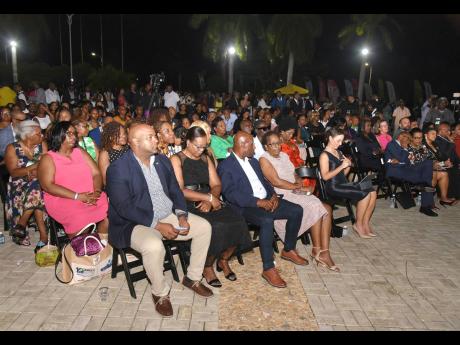Kayonne Christy | Leverage circular migration for Jamaica’s development
The 10th Biennial Jamaica Diaspora Conference recently convened over 1,200 attendees in Montego Bay to discuss strengthening engagement between Jamaica and its diaspora. Key stakeholders, including government officials, private sector leaders, local Jamaicans, and Jamaicans living abroad, emphasized the call for diaspora members to “come home”. This call raises two critical questions: what does the diaspora “coming home” mean in 2024? And how might policymakers and stakeholders realistically think about and plan for such an eventuality in today’s highly mobile global context?
Today, traditional notions of return migration — typically characterised by permanent physical relocation to one’s country of origin — are becoming increasingly outdated. The binary assumption that emigrants either stay abroad or return home permanently fails to capture the dynamism and diversity of contemporary return mobility trends, particularly (and perhaps most significantly) circular migration.
Circular migration refers to the seasonal, temporary, and/or repetitive movement of migrants between their home and host countries. Historically associated with temporary/seasonal work programmes, circular migration now captures a broader range of migration patterns that are influenced by and dependent on cross-border connections. In the context of the Jamaican diaspora, circularity, then, not only encompasses the seasonal employee participating in Canada’s Seasonal Agricultural Worker Program, but also the teenager of Jamaican descent who spends summers in Jamaica visiting family; the entrepreneur who comes to the island from time to time to directly oversee business operations that they mostly run remotely; the venture capitalist exploring new investment opportunities; the philanthropist refurbishing the health centre in their home community; the digital nomad who works online in Jamaica for part of the year; and many other circular configurations of “return”.
TRANSNATIONAL FLOWS
Circular patterns of mobility facilitate the transnational flows of labour, skills, capital, resources, and networks between countries, which can positively contribute to economic growth and national development. Indeed, Jamaica’s current labour market would benefit from such circularity. Introducing more global talent into the local labour market would not only address current labour shortages, as highlighted in our 2024 report, Brain Gain: Solving the Labour Shortage and Competing for Global Talent, but also address issues around low productivity in local industries, as discussed in our 2023 report, Growthless Jobs: The Paradox of Rising Employment and Stagnant Output.
Beyond addressing immediate labour and developmental needs, robust strategies to encourage and facilitate varied patterns of circular migration will also help to sustain trans-generational diaspora engagement. Fostering and maintaining cultural connections to Jamaica among young, second to fourth generation Jamaicans has been identified by the government as a key priority. Government strategies aimed at engaging this population often leverage short-term visits to the homeland for an immersive educational, cultural, and/or professional experience (see Morocco’s ‘Summer University for the Young Moroccans Living Abroad’, and Israel’s ‘Taglit Birthright Program’). Short-term visits to a homeland strengthen cultural connections among younger generations of a diaspora. These visits are effective at fostering a sense of affinity and belonging among second and subsequent generations, and can inspire long-term engagement and investments from younger diaspora members.
Despite these benefits, Jamaica continues to lag in implementing strategies to support and encourage circular migration among its diaspora population. Jamaica’s Returning Resident Programme, for example, offers customs duty concessions for Jamaican citizens over the age of 18, who have been out of the country for more than three years, and who intend to permanently relocate to Jamaica. Such a programme not only overlooks the changing nature of return (namely, circularity) but, importantly, also overlooks the changing demographic composition of the diaspora, which now consists of a large and growing population of second and subsequent generation Jamaicans, who may not be official citizens of Jamaica but who should nevertheless be included in a robust return strategy.
FINANCIAL INCENTIVES
A common approach in migrant-sending countries is to offer financial incentives for emigrants to return, seen in initiatives like the Philippines’ Balikbayan Program, China’s Thousand Talents Plan, and Jamaica’s Return of Talent Programme. However, these programmes face challenges such as retaining returnees and perceptions of unfair benefits. Evidence suggests that while incentives can attract diaspora members, they alone are insufficient to promote return. Addressing these challenges requires reducing barriers to circular migration and improving access to information on return and reintegration. Jamaica’s National Diaspora Policy and National Policy on International Migration and Development reference the importance of this, but there remain few commensurate changes to meaningfully facilitate circularity among various segments of the diaspora.
Strategies to encourage circular migration might include: offering flexible residency rights for circular returnees, portable work benefits; updating Jamaica’s Returning Residents Handbook to enhance reintegration support by linking returnees with relevant government entities, community-based organisations, and civil society groups; expanding diaspora engagement initiatives like the Digital Registration Portal (ConnectMeJA) to promote local job opportunities for Jamaicans abroad; establishing a skills database to align diaspora skills with local needs; and centralising online access to residency information, such as unconditional landing, stay extensions, and pathways to citizenship, to streamline diaspora members’ temporary residence in Jamaica.
The government’s response to calls for the diaspora to “come home” must align with today’s dynamic global context. A robust return strategy should prioritise circular migration, enabling all generations of the diaspora to maintain strong ties with their homeland, to participate in its social, cultural, and economic life, and to contribute to its growth. Such an approach will allow Jamaica to leverage the full potential of its diaspora for the country’s development.
Kayonne Christy’s is research intern at CAPRI. CAPRI Commentary is a platform where researchers share timely and succinct insights on topical public policy issues. Like the reports, the commentary is evidence-informed, and backed by reliable data and research. Send feedback to communications@capricaribbean.org


